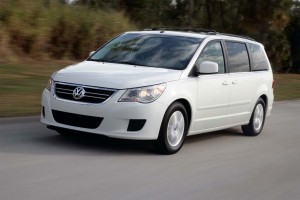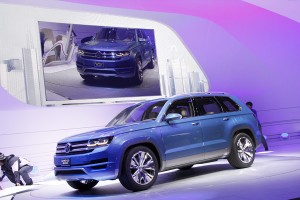Volkswagen has taken the axe to not one but two of its minivans. Just days after confirming the end of a 60-year run for the aging Microbus, the legendary Hippie Van of the ‘60s, the German maker says it has also pulled the plug on the newer – but far less successful Routan minivan.
The Routan was the product of a joint venture between VW and Chrysler, and was little more than a slightly revised version of the American maker’s Dodge Caravan minivan. First introduced during the 2009 model-year, the three-row people-mover failed to generate much demand, sales averaging barely 11,500 a year, barely a quarter of the 45,000 and 50,000 units VW had originally hoped to sell annually.
Only a handful of 2014 models have been produced and none will be sold to the public, according to Volkswagen.
Introduced at the 2008 Chicago Auto Show, the Routan was actually a holdover project originally conceived between Volkswagen and the former DaimlerChrysler. It came to market about the same time the German and U.S. auto arms of that ill-fated alliance broke up.
Sales of the Routan came to a grand total of 57,683 during its five-year run, according to Autodata, or about 10% of the Dodge Caravan’s volume during that period. There were some modest cosmetic changes made to differentiate between the two minivans, but the biggest difference was that the VW model lacked the fold-up Stow ‘n’ Go second-row seating found on the Caravan and the similar Chrysler Town & Country models.
While Chrysler is often credited with offering the first “true” minivan in the U.S. market, Volkswagen bridles at that claim and contends its original Microbus fit that description. Indeed, it was one of the most popular vehicles – along with the VW Beetle – among the youth culture of the 1960s. The Microbus was later replaced with the Eurovan, a model that never gained much traction in the U.S. and there was no minivan at all in the VW U.S. line-up from 2004 until the arrival of the Routan.
The Microbus was pulled from the American market – and most other industrial markets – because it could not meet modern safety and emissions standards. It continued in production in several emerging markets, production ending in 1996 in Mexico, and only now in Brazil.
(For more on the aging VW Microbus’ long run, Click Here.)
A number of other minivans have been pulled from production in recent years, especially in the U.S., where sales of the once wildly popular people-movers have dwindled sharply. Both General Motors and Ford have abandoned the segment, relying on SUVs, crossovers and other hard-to-categorize products like the Ford Flex to compete with the few remaining minivan manufacturers.
(What is it? Many new vehicles defy easy categorization. Click Here to learn more.)
Volkswagen is also looking for an alternative and has strongly hinted that it will launch production of a new crossover based on the popular CrossBlue concept, a three-row crossover. It has not decided whether to offer a hybrid version similar to the concept model which was equipped with a diesel-electric powertrain.
It is expected that the production version of the CrossBlue will be produced at the Volkswagen plant in Chattanooga, Tennessee, though VW has repeatedly delayed a final decision on that move. Company insiders say they still hope to have a decision in place by the Volkswagen board before year-end.



There was little reason for folks to buy a Chrysler mini-van with VW detailing. If VW wants to offer a successor to the VW Micro bus it needs to be unique and engaging, not a hippie bus. There needs to be a reason for people to chose it over a typical mini-van.
I think they announced that they discontinued it a few times before.
VW has a Mazda MPV-sized minivan, configured inside like a Honda Pilot, with the Passat’s torquey diesel, that is such a great seller in Europe its been around for 9+ years. Called Touran. I got 33 mpg on a weeks driving, 5 adults, 2 little kids, loads of luggage, speed limit 83 mph. I would LOVE to have one here. Why did they bother with the Caravan/Routan?
Apparently because it was cheap and easy to add to the line-up v trying to homologate a Touran not designed up front for the US market.
Paul E.